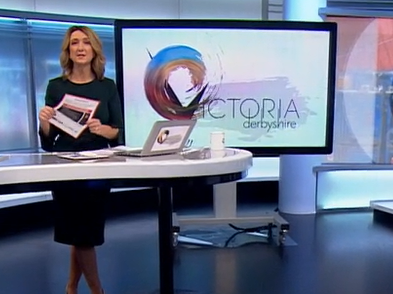
BBC director general Tony Hall has reaffirmed the corporation’s policy that freelance shifts should always be paid after it emerged that unpaid trials were used at BBC Two’s Victoria Derbyshire show and the BBC World Service.
SNP MP Stewart McDonald wrote to Lord Hall in August after he was told by the deputy editor of the Victoria Derbyshire show (pictured) that the show offered a single unpaid “shadowing” shift to new freelance journalists.
McDonald had appeared on the show in March to discuss the Unpaid Trial Work Periods (Prohibition) Bill, saying such shifts should be outlawed.
The MP wrote again to Lord Hall last month after Private Eye revealed a producer who agreed to do an unpaid shift at the BBC World Service had been told he could not get a taxi on the corporation when the shift ended at midnight as they were freelance.
They were also allegedly told that, although the shift had gone well, they would have to pay £60 for training with no guarantee of paid BBC work to follow.
McDonald has now said the fact freelances had worked for hours for free was “appalling”, calling the shifts “openly exploitative”.
In his second letter, McDonald wrote: “This is yet another disappointing and worrying example of the public service broadcaster contributing to the culture of unpaid work, despite having done a lot to highlight the issue.”
He added that he did not believe the BBC should end its scheme of offering shifts to external freelances, but instead that they should be paid at least the national minimum wage on such shifts.
In Lord Hall’s reply sent last week, seen by Press Gazette, he said the BBC’s policy for all roles is “not to use unpaid trial periods or shadow shifts as part of our permanent or freelance recruitment processes”.
However he admitted “two of our production areas” had offered “supernumerary shadowing positions in order for freelances to build their understanding of the BBC”.
Lord Hall said both departments had now been told such shifts are not within BBC policy and should always be paid, and that a reminder of this policy was being sent to all BBC News team leaders.
He wrote: “I would like to reassure you that the BBC is committed to maintaining the very highest standards and leads the way in providing high quality paid opportunities for young people aiming to get their foot on the career ladder.”
In a statement, McDonald said: “It is vital that freelancers are given the opportunity to demonstrate their skills, and it is appalling that they have had to work for hours on end with no pay.
“I am pleased that the BBC have reinforced their policy to ensure freelancers get the pay they deserve, which is the very least people would expect from a big organisation like the BBC.
“Whilst I am pleased that this has turned around and been corrected, this openly exploitative practice should never have happened in the first place. Anyone who does a fair day’s work deserves a fair day’s pay – and it shouldn’t take an MP’s intervention to reinforce that.”
The National Union of Journalists told Press Gazette it will take this case up and expects the individuals concerned to be paid in full for the appropriate rate of their shift.
Michelle Stanistreet, NUJ general secretary, said: “It is completely unacceptable for the BBC to trade on the aspirations of casual workers by demanding that they work shifts for free.
“It is shabby and exploitative and wholly outwith of the stated values of our public service broadcaster. It is helpful that the director general has made it clear that this is not something that should be happening, but it is disturbing that this abuse is going on in the first place.”
A BBC spokesperson said: “For all roles, the BBC’s policy is not to use unpaid trial periods as part of our recruitment processes.
“We have followed up with these production areas in question and all our team leaders across BBC News to remind them of this policy.
“The BBC is committed to maintaining the very highest standards and leads the way in providing high quality paid opportunities for freelancers and young people aiming to get their foot on the career ladder.”
Email pged@pressgazette.co.uk to point out mistakes, provide story tips or send in a letter for publication on our "Letters Page" blog

